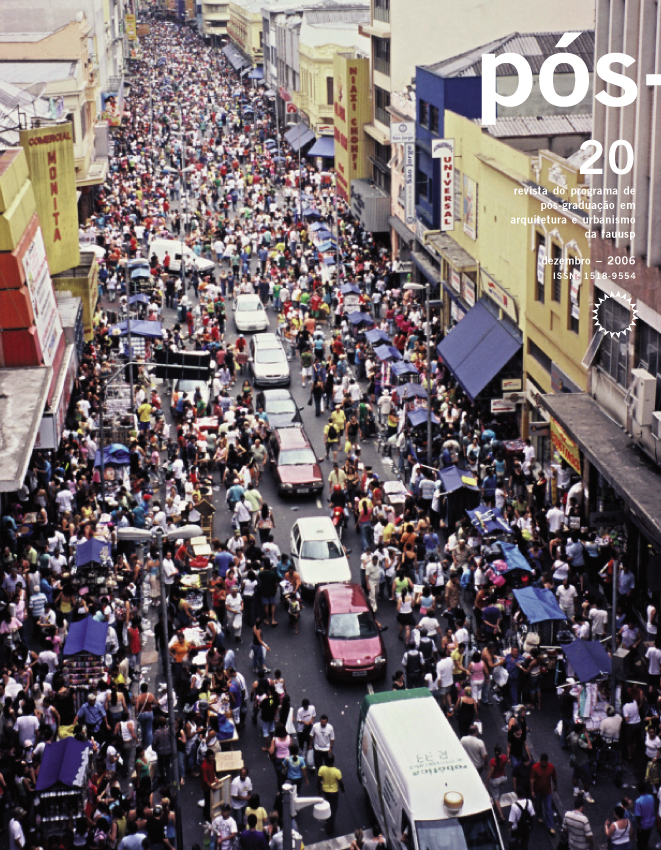The" urban adjustment": the World Bank's and the Inter-american Development Bank's policies for cities
DOI:
https://doi.org/10.11606/issn.2317-2762.v0i20p60-75Keywords:
World Bank, Inter-American Development Bank, urban and housing policies, public financing, public management, reform of government, structural adjustmentAbstract
The process of structural adjustment following the Third-World debt crisis in the early 1980s - and still persisting as a permanent adjustment - seems to have produced a corresponding" urban adjustment". In both the structural and urban adjustments, the roles of the World Bank and, in Latin America, of the IDB, in partnership with local elites and technocracies, were decisive. Despite of the strong interference of the two financial institutions with public policies in the developing world, their strategies for action represent a new theme that has not been fully surveyed by academic research. The purpose of this paper is to study the type of model for a city defended by these institutions, as well as the meaning of this model. In my Master's dissertation at FAUUSP, I found that World Bank and IDB loans - which come to public managers as a" salvation" in times of crises - are not" neutral" and carry with them an agenda: they are intended to model given standards for the use of public resources and for the organization of governments. Both institutions have disseminated public policies that follow corporate profitability criteria and a public management model based on outsourcing, which is subject to private technical staffs from project management companies, private foundations, NGOs, and numerous consultants. Their purpose is to change some local governments in developing countries - particularly those that include territories that support transnational business - into administrative structures that are increasingly trained to respond to big private interests and are free from any commitment to real democracy.Downloads
References
BANCO MUNDIAL. Urbanization. Washington: Banco Mundial, 1972.
BANCO MUNDIAL. Housing: Report on sectorial policy. Washington: Banco Mundial, 1972.
BANCO MUNDIAL. Housing: Enabling housing markets to work. Washington: Banco Mundial, 1993.
BANCO MUNDIAL. Cities in transition: Urban and local government strategy. Washington, Publication: Banco Mundial, 2000.
BID. El BID y la vivienda. Washington: Banco Mundial, 1963.
BID. El BID y la vivienda. Operational guidelines for housing. Washington: Banco Mundial, 1998.
BURGESS, Rod. Helping some to help themselves: Third world housing policies and development strategies. In: MATHÉY, Kosta. Beyond self-help housing. Londres: Mansell, 1992.
CAMPBELL, Tim. Innovations and risk taking: The engine of reform in local government in Latin America and the Caribbean. Washington: Banco Mundial, 1997.
CHOSSUDOVSKY, Michel. The globalization of poverty: Impacts of International Monetary Fund and Banco Mundial reforms. Penan: Third Word Network, 1997.
CITIES ALLIANCE. Cities alliance for Cities without Slums: Action plan for moving slum upgrading to scale. Washington: Banco Mundial e Habitat/ONU.
DAVIS, Mike. Planet of Slums. New Left Review, Londres, n. 26, p. 5-34, mar./abr. 2004.
FREIRE, Mila; STREN, Richard. The challenge of urban government. Polices and practices. Washington: Banco Mundial, 2001.
FREIRE, Mila; POLÈSE, Mario. Connecting cities with macroeconomic concerns: The missing link. Washington: Banco Mundial, 2003.
HARVEY, David. Do gerenciamento ao empresariamento: A transformação da administração urbana no capitalismo tardio, Espaço & Debates, São Paulo, n. 39, p. 48-64, 1996.
IGLESIAS, Enrique. Reflexiones sobre ele desarollo económico. Washington: BID/1992.
KESSIDES, Cristine. World Bank experience with the provision of infraestructure services for the urban
poor. Washington: Banco Mundial, 1997.
KESSIDES, Christine; BAHAROGLU, Deniz. Urban poverty. Washington: Banco Mundial, 2001.
MCNAMARA, Robert. The McNamara years at the World Bank: 1968-1981. Londres: John Hopkins
University Press, 1981.
MOURA, Alexandrina; MELO, Marcus André. Políticas públicas urbanas no Brasil: uma análise dos
projetos do Banco Mundial. Revista Planejamento e Políticas Públicas, n. 4, p. 99-126, 1990.
OSMONT, Annik. La Banque mondiale et les villes: du développement à l’ajustement. Paris: Karthala, 1995.
PEET, Richard. Unholy Trinity: The IMF, World Bank and WTO. Londres: Zed Books, 2003.
PRICE, Lisette. Governance: Experience in Latin America and the Caribbean. Washington: Banco Mundial, 1991.
RENAUD, Bertrand; BUCKLEY, Robert. Urban finance in post depression Latin America: The solvency status of urban borrowers. Washington: World Bank working paper, 1988.
ROJAS, Eduardo. The BID in low-cost housing: The first three decades. Washington: BID, 1995.
ROSSETTO, Rossela. Organismos internacionais e a autoconstrução: Análise e reflexões sobre as políticas de habitação para população de baixa renda. 1993. Dissertação (Mestrado) – Faculdade de Arquitetura e Urbanismo, Universidade de São Paulo, São Paulo, 1993.
TAVARES, Laura. Ajuste neoliberal e desajuste social na América Latina. Petrópolis: Vozes/ CLACSO/ LPP, 2000.
WERNA, Edmundo. As políticas urbanas das agências multilaterais de cooperação internacional para países em desenvolvimento. Espaço & Debates, São Paulo: Neru, n. 39, 1996.
Downloads
Published
Issue
Section
License

This work is licensed under a Creative Commons Attribution 4.0 International License.
DIADORIM - Diretório de Políticas Editoriais












